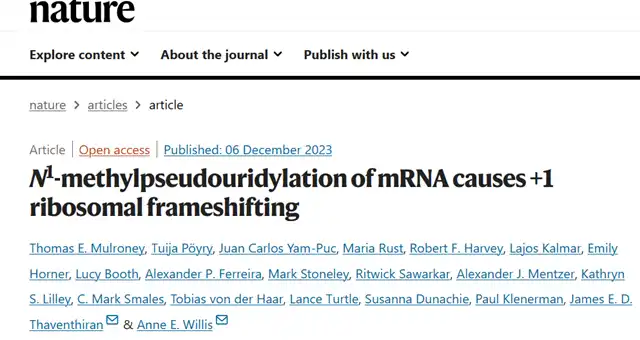Nature: mRNA Vaccines Induce Unexpected Protein Production
- Normal Liver Cells Found to Promote Cancer Metastasis to the Liver
- Nearly 80% Complete Remission: Breakthrough in ADC Anti-Tumor Treatment
- Vaccination Against Common Diseases May Prevent Dementia!
- New Alzheimer’s Disease (AD) Diagnosis and Staging Criteria
- Breakthrough in Alzheimer’s Disease: New Nasal Spray Halts Cognitive Decline by Targeting Toxic Protein
- Can the Tap Water at the Paris Olympics be Drunk Directly?
Nature: mRNA Vaccines Induce Unexpected Protein Production
- Should China be held legally responsible for the US’s $18 trillion COVID losses?
- CT Radiation Exposure Linked to Blood Cancer in Children and Adolescents
- FDA has mandated a top-level black box warning for all marketed CAR-T therapies
- Can people with high blood pressure eat peanuts?
- What is the difference between dopamine and dobutamine?
- How long can the patient live after heart stent surgery?
Nature: mRNA Vaccines Induce Unexpected Protein Production
Even after administering billions of doses during the COVID-19 pandemic, messenger RNA (mRNA) vaccines continue to hold surprises.
A recent study published in Nature suggests that mRNA vaccines may prompt cells to produce small amounts of unexpected proteins.
Researchers propose a solution to enhance the safety and effectiveness of future mRNA-based vaccines or drugs.

Virologist Stephen Griffin from the University of Leeds in the UK describes this research as a “milestone,” providing new insights into how cells utilize natural and artificial mRNA to manufacture proteins.
He adds, “In the future, RNA technology may have broader therapeutic applications beyond vaccines, potentially involving higher doses and more frequent administrations, so any potential issues need to be addressed.”
The mRNA strand carries the blueprint of cellular genes to the protein-manufacturing machinery known as the ribosome. The ribosome reads three bases of mRNA at a time, where each triplet, or codon, specifies an amino acid in the protein. Potential mRNA vaccines and therapies consist of artificial mRNA carrying specific protein instructions.
For vaccines, the goal is to elicit an immune response against proteins like the spike protein of the novel coronavirus. mRNA therapies aim to induce the production of proteins that can treat diseases.
However, the presence of foreign RNA often signals an attack by a virus, leading cells to identify and destroy it. Decades ago, researchers Katalin Karikó and Drew Weissman at the University of Pennsylvania discovered that by changing one base of mRNA, replacing uridine with pseudouridine, the modified strand could evade degradation for a sufficient period, allowing cells to produce the intended protein. This groundbreaking research, recently awarded the Nobel Prize, has accelerated the development of mRNA vaccines and therapies.
Nevertheless, the new study uncovers a pitfall in RNA modification strategies. Toxicologists Anne Willis, James Thaventhiran, and colleagues from the University of Cambridge sought to understand the impact of pseudouridine on the protein manufacturing process. Sometimes, the ribosome misreads natural mRNA, and researchers wanted to know if this error became more common when the altered base was inserted. They designed an mRNA that only prompts cells in a culture dish to produce fluorescent proteins when the ribosome “slips” and misreads a three-letter codon, causing a frameshift error. In natural mRNA, this often results in the production of inactive proteins degraded by the cell.
Researchers found that in COVID-19 vaccines produced by Pfizer and Moderna in the United States, mRNA with pseudouridine was more likely to induce the production of frameshift proteins than mRNA with normal uridine. In their experiments, approximately 8% of proteins produced by mRNA exhibited frameshift errors.
To test if similar results occurred in vivo, the research team compared the immune responses of mice immunized with Pfizer’s COVID-19 mRNA vaccine and AstraZeneca’s DNA vaccine. They found that mice vaccinated with the Pfizer vaccine produced antibodies against frameshift-derived proteins, while those vaccinated with the AstraZeneca vaccine did not.
Subsequently, the researchers examined the immune responses of 20 AstraZeneca vaccine recipients and 21 Pfizer vaccine recipients. About one-third of Pfizer vaccine recipients’ blood samples showed an immune response to frameshift proteins, while the samples from AstraZeneca vaccine recipients did not. Researchers emphasized that no one reported any adverse effects related to a specific vaccine, and there is no evidence suggesting frameshift proteins are harmful.
The Cambridge University team stressed during a press conference that their work does not imply that COVID-19 vaccines are unsafe. Karikó pointed out that frameshifts often naturally occur when infected cells produce viral proteins, and these frameshift proteins can naturally amplify the body’s immune response.
However, Thaventhiran suggested that frameshifts may be more crucial in other applications of mRNA technology, such as cancer vaccines designed to trigger immune responses against tumor-specific proteins. Cancer patients may have undergone other treatments altering their immune system, making them more susceptible to the effects of erroneous proteins and potential immune responses.
The Cambridge University team revealed the reasons for frameshift occurrence through further experiments and explored potential methods to avoid them. They found that the ribosome slows down when encountering pseudouridine, especially when the sequence contains several pseudouridine bases. Willis mentioned that this may be because the altered base “doesn’t fit the ribosome as well as standard bases,” increasing the chances of frameshifts. The researchers also developed an algorithm to identify potential problematic sequences and replace them with sequences less likely to cause errors, while still producing the same protein accurately.
Molecular biologist Rolf Marschalek from Goethe University Frankfurt in Germany stated that he needs more evidence to consider frameshifts a significant issue in mRNA modification. However, he also believes that this new research is not a reason to be concerned about the safety of mRNA vaccines. “The bigger issue is that people underestimate the Omicron variant and haven’t received the latest booster shots.”
Related Paper Information:
Nature: mRNA Vaccines Induce Unexpected Protein Production
(source:internet, reference only)
Disclaimer of medicaltrend.org
Important Note: The information provided is for informational purposes only and should not be considered as medical advice.



